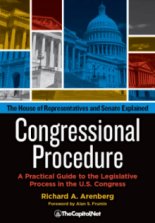Appeal (CongressionalGlossary.com)
From the Congressional Glossary – Including Legislative and Budget Terms Appeal photo credit: mikecogh A member’s challenge of a ruling or decision made by the presiding officer of the chamber. In the Senate, when the chair rules on a point of order, any senator may appeal the ruling. The full Senate makes a final decision … Read more


